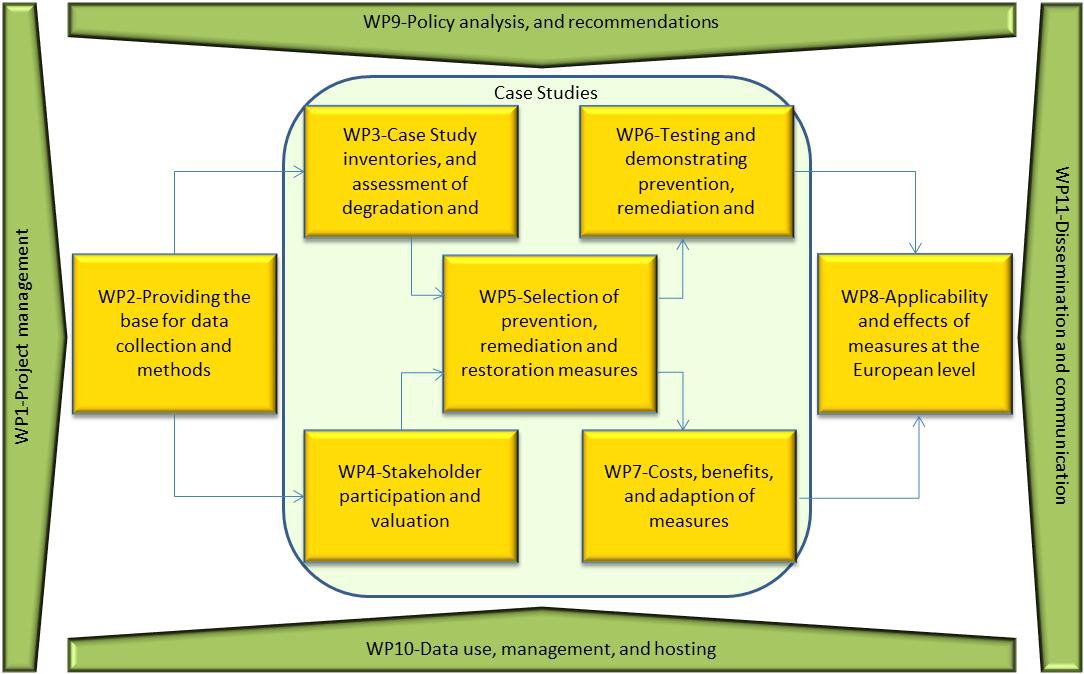RECARE is comprised of 11 Work Packages (WPs), each carried out by different institutions. Two of WOCAT’s Consortium Partners are involved, with ISRIC–World Soil Information implementing WP5 and the Centre for Development and Environment responsible for WP4.
The main aim of RECARE is to develop effective prevention, remediation and restoration measures using an innovative transdisciplinary approach, actively integrating and advancing knowledge of stakeholders and scientists in 17 case studies, covering a range of soil threats in different bio-physical and socio-economic environments across Europe.
The case studies consider/ evaluate:
1. the current state of degradation and conservation using a new methodology, based on the WOCAT mapping procedure,
2. impacts of degradation and conservation on soil functions and ecosystem services. These will be quantified in a harmonized, spatially explicit way, accounting for costs and benefits, and possible trade-offs,
3. prevention, remediation and restoration measures, selected and implemented by stakeholders,
4. the applicability and impact of these measures at the European level using a new integrated biophysical and socio-economic model.
RECARE is comprised of 11 Work Packages (WPs), each carried out by different institutions. Two of WOCAT’s Consortium Partners are involved, with ISRIC–World Soil Information implementing WP5 and the Centre for Development and Environment responsible for WP4.
The Centre for Development and Environment (CDE) at the University of Bern implements WP4 (“Stakeholder participation and valuation”). Solutions for sustainable soil management can only be identified, developed, and implemented successfully if the diverse needs of all stakeholders are taken into account. CDE's activities within the RECARE project focus on creating stakeholder platforms to promote knowledge exchange and joint learning among different actors, including practitioners and scientists. Stakeholders will be involved in project activities throughout the entire project duration, for example by means of workshops. Based on knowledge pooled in this way, CDE and its research partners are developing a universally applicable methodology for assessing and valuing both the impacts of soil degradation and the effects of sustainable soil management on soil functions and ecosystem services. This methodology will then be applied in the project’s 17 case studies.
WP5 (“Selection of promising prevention, remediation, and restoration
measures”) holds a central position within the project structure (Figure 1),
examining the selection of promising and innovative measures to be implemented
at the 17 RECARE case study sites. Main tasks include holding training
workshops for stakeholder involvement (“train the trainers”), designing
guidelines and tools for supporting the stakeholder-based process, and
facilitating the inclusion of promising SLM measures into the WOCAT database.
Figure 1: Framework of the RECARE project, with WP5 placed in a central position.

On the input side at WP5, ISRIC is dependent on
information about the state of soil degradation and conservation provided by
the case study sites (WP3), as well as specific tools for stakeholder
participation and valuation (WP4). ISRIC’s own activities directly feed into
WP6, which takes care of the test-implementation of selected SLM measures. WP7
on cost-effectiveness of the implemented measures can draw information from the
WOCAT technologies and approaches recently entered.
In WP5, 55 SLM technologies and 17 approaches were
comprehensively documented in the WOCAT Database and a summary report was
prepared (RECARE project 15: Inclusion of prevention remediation and restoration
measures). The WOCAT methods for documenting technologies and approaches and for
mapping were evaluated for their applicability with regards to European soil
threats and general conditions. Some recommendations were made (in Report 15)
and will be integrated in a revision of the WOCAT methodology (outside the
scope of the RECARE project).
ISRIC also assisted WP3 with mapping the state of degradation and conservation. Maps on various aspects of degradation (soil threats) and conservation (SLM) were prepared for all study sites except one, following the WOCAT mapping methodology. Maps are accessible through the WOCAT Mapping Database and through the RECARE webmap platform at JRC (in ESDAC). Methodology and results are summarized in RECARE Report 08: Reporton current state of degradation and conservation.
Project results are continuously disseminated through the RECARE information hub: The RECARE project can also be followed on Twitter (@RECARE_EU) and Vimeo.
Peer-reviewed scientific publications from the project: http://www.recare-hub.eu/tools-and-outputs/scientific-journal-articles
2013 - 2018
Our site saves small pieces of text information (cookies) on your device in order to deliver better content and for statistical purposes. You can disable the usage of cookies by changing the settings of your browser. By browsing our website without changing the browser settings you grant us permission to store that information on your device.